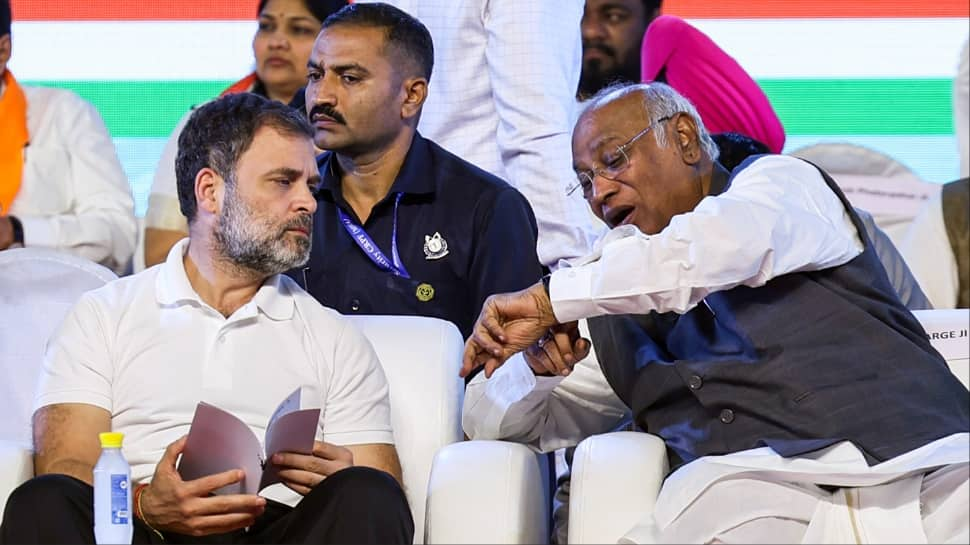 |
|
The Indian political landscape is currently witnessing a heated exchange between the Bharatiya Janata Party (BJP) and the Indian National Congress (INC), stemming from allegations of vote-buying in the recent Maharashtra Assembly elections. Vinod Tawde, a BJP leader, has issued legal notices and filed a defamation suit against prominent Congress figures, including party president Mallikarjun Kharge, Lok Sabha Leader of Opposition Rahul Gandhi, and spokesperson Supriya Shrinate. The controversy centers around accusations made by the Bahujan Vikas Aghadi (BVA), which claimed that Tawde distributed ₹5 crore to influence voters. This accusation led to a confrontation at a hotel in Mumbai where Tawde was present, escalating the political tension significantly.
Tawde vehemently denies the allegations, asserting that no such money was recovered by the Election Commission or the police during their investigations. He attributes the accusations to a smear campaign orchestrated by the Congress to damage his reputation and that of his party. His legal notice to Kharge, Gandhi, and Shrinate strongly criticizes their actions, stating that they knowingly spread false information despite being aware of the lack of evidence to support the allegations. The notice highlights the deliberate and malicious nature of the accusations and the significant damage they have caused to Tawde's public image, emphasizing that he was not involved in any illegal activities.
The legal action taken by Tawde includes demands for an unconditional apology within 24 hours of receiving the notice, along with publication of the apology in newspapers and on X (formerly Twitter). If the Congress leaders fail to comply, Tawde has threatened to proceed with criminal defamation proceedings under Section 356 of the Bharatiya Nyaya Sanhita, and parallel civil proceedings seeking compensation of ₹100 crore. This substantial sum underscores the severity of the accusations and the damage Tawde believes he has suffered due to the Congress leaders' actions. The case has attracted significant media attention, further highlighting the intense political rivalry between the BJP and the Congress in Maharashtra.
This incident underscores the highly charged political climate leading up to and following elections in India. Accusations of vote-buying, or other electoral malpractices, are frequent during election seasons, often becoming focal points of political campaigning and subsequent legal battles. The aggressive legal response from Tawde reflects the significant personal and reputational stakes involved in such accusations, particularly for high-profile political figures. The outcome of this case will undoubtedly have implications beyond the individuals involved, potentially impacting future political discourse and the legal framework surrounding electoral integrity. The use of social media, as evidenced by Tawde’s tweet announcing the legal action, highlights the growing role of digital platforms in shaping public perception and influencing political narratives.
Furthermore, this incident raises questions about the responsibility of political leaders and the media in disseminating information. The accusations against Tawde were widely publicized, impacting his image and potentially influencing public opinion before any comprehensive investigation could be completed. The legal recourse Tawde has taken emphasizes the need for careful fact-checking and responsible reporting, particularly in the context of potentially damaging allegations made during politically sensitive periods. The potential for both reputational damage and financial penalties through legal actions like this serves as a reminder of the potential consequences of spreading false information.
Finally, the legal battle between Tawde and the Congress leadership highlights the complex interplay between politics and law in India. The legal framework surrounding defamation and the extent to which it can protect individuals from false accusations are constantly being tested in cases such as this. The ultimate decision in this case will not only have ramifications for the individuals involved but also contribute to the ongoing discussion about the need for strong mechanisms to protect individuals against false allegations while preserving the freedom of speech and expression.
The high stakes involved in this case make it a significant development in Indian politics and a potential precedent for future legal challenges surrounding electoral integrity and accusations of impropriety. The substantial financial damages sought by Tawde further emphasizes the seriousness with which such accusations are perceived and the lengths to which individuals are willing to go to defend their reputation and career in the highly competitive world of Indian politics.
Source: 'Low-Level Politics': BJP's Tawde Sends Notice To Rahul, Kharge In Cash-For-Vote Row, Seeks Apology
